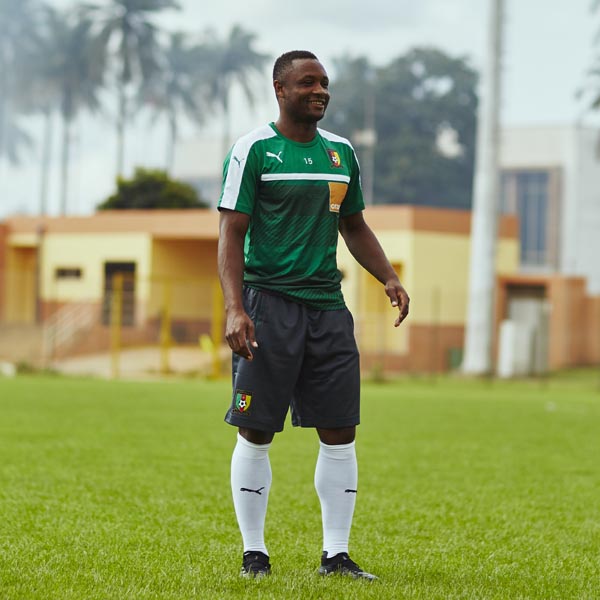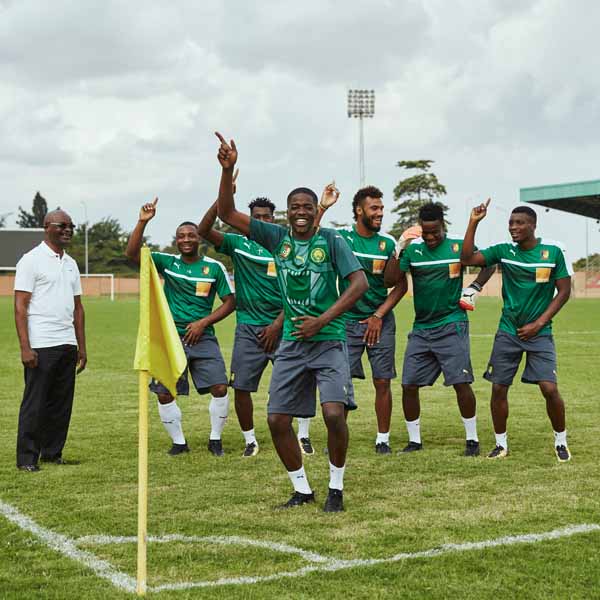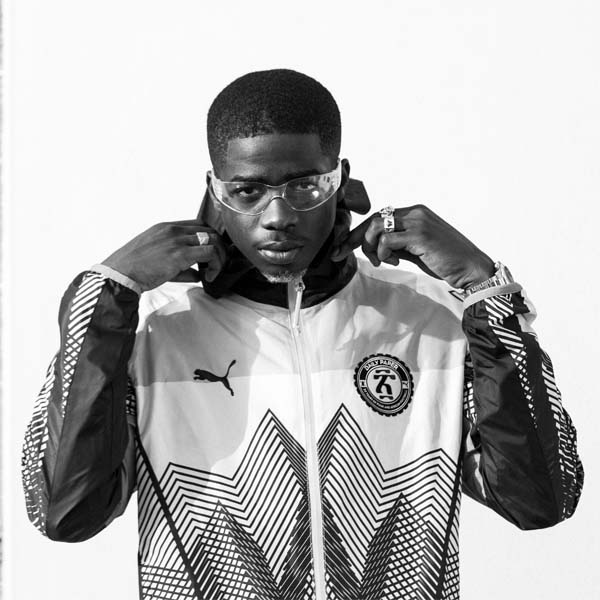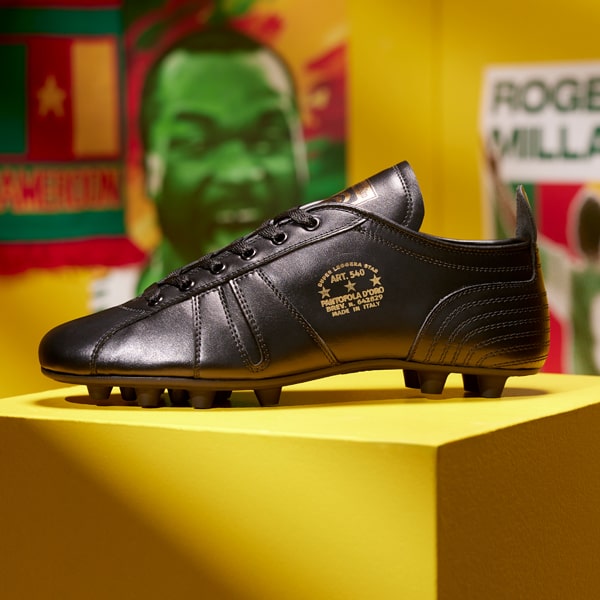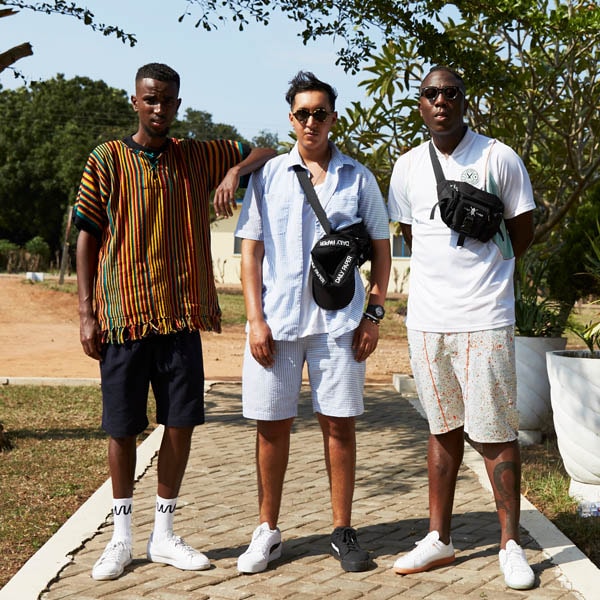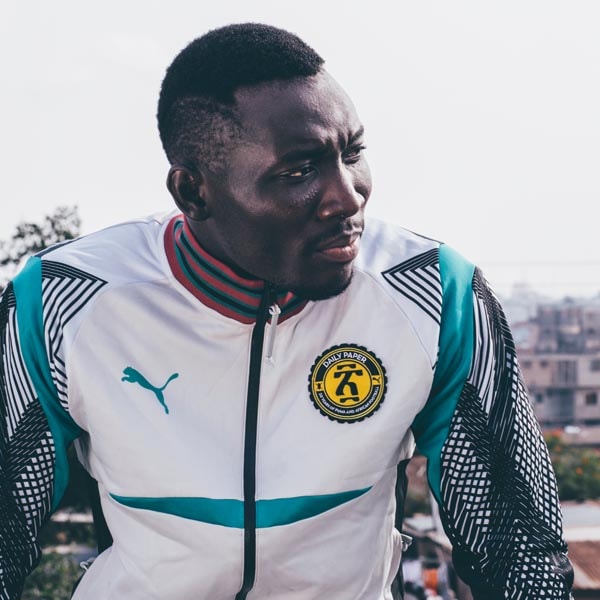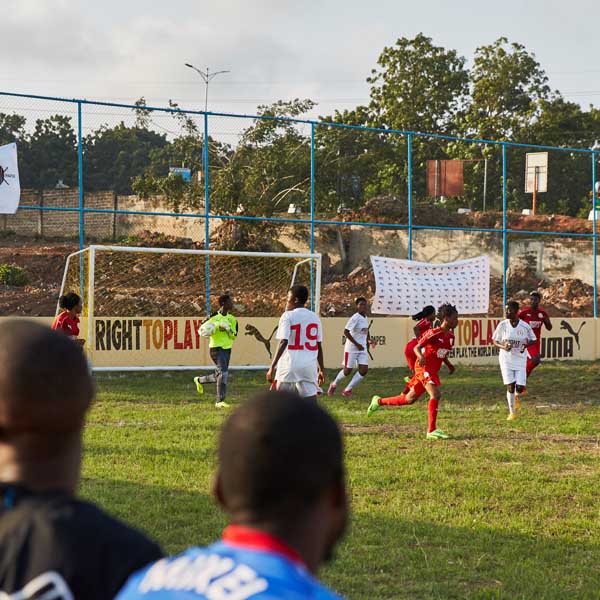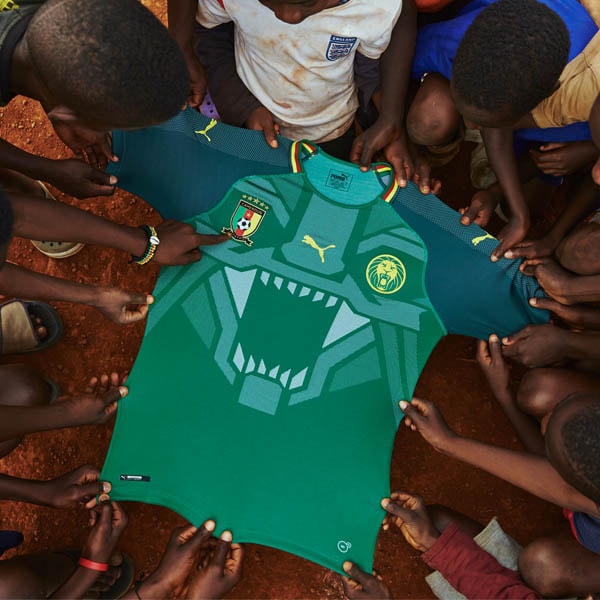Roger Milla is Mr Cameroon. A legend of the game with one of the most positive outlooks on life. An ambassador of African football and an icon of 1990s football who is still influencing and inspiring to this day. When football in Cameroon is mentioned, Milla is always nearby.
Unsurprisingly, the main man was roped into starring in the new PUMA Cameroon Home Shirt film with Afro-Trap artist Cameroon, and it's here in Yaounde we sit down with a true great. Asking Roger Milla to do his trademark dance through a French translator (for the above photo) was one to tick off the bucket list. Going back to Roger Milla's house for a bit of lunch means we've peaked as a football publication. It's all downhill from here. But first, here's what Milla had to say...
Roger, you first busted out your famous celebration almost 30 years ago. How does it feel that people still talk about it?
I believe it’s the work I’ve done for years that people like. I started playing in Europe when I was 25, 26 years old. It was difficult for a 25 years old football player to leave Africa, move to Europe and do what I did. I believe that’s what people appreciate. I'm also told that people like me because they say that I'm humble. That's nice to hear.
Today, you filmed a video for PUMA featuring your dance move. How did you come up with this signature move?
It came out of nowhere. I did not even know I was going to play during this World Cup, I was 38 already. The manager at the time did not want to hear about me joining the team, even though I won the 1988 African Cup of Nations in Morocco. There was me and Thomas N’Kono, he did not want us in the squad. I went to Cameroon for Théophile Abega’s jubilee [former team captain] and did extraordinary things on the field during this match. The public said "you pretend this guy is old but we need him."
So, it just came naturally?
Exactly, it came naturally. Little did I know I was going to play, I did not know I was going to score! At this age, in a World Cup! It was totally spontaneous, like an explosion of joy.
It really left a mark in people’s memories. How many times have you been asked questions about it?
I can’t even count. I’ve stopped counting! I was in Israel recently, and that was the same question over and over again. In Morocco, before that, it was the same. I’m asked every single day. Even here in Cameroon, people know me and yet I have that question asked every day.
Now talking about music, there's an artist called MHD who has a song titled Roger Milla. When was the first time you heard that song?
My children told me "Dad there's this guy who sings your name", I said “what guy?” and they said "you have to listen to it." I loved it straight away and decided to meet him when I was in Paris. He did not know I was in Paris, a friend must have told him. He was doing a show in Évry and came to my hotel to invite me to his concert. It was a show for kids, the public was entirely made up of children. Those kids were singing along with him, singing my name, it was great! When you know his personal story and what he wants to do know, it’s great.
How do you feel when you see that the new generation have so much respect for what you’ve done for football in Cameroon?
The youth in Cameroon are very appreciative of what I did. Their parents must have told them my story. I am surprised and deeply moved when I hear a 4, 5 or 6 year old child calling me by my name. They have never even seen me play football! They tell me “Monsieur Milla we saw a picture of you!” It’s very moving.
PUMA contacted you regarding the launch of the new Cameroon shirt. Were you immediately keen to get involved?
Look, I’m Cameroonian. Anything that is symbolic for Cameroon, I’ll be there. All the more when PUMA is concerned. I have been there every time a new official PUMA shirt was launched.
When FIFA threatened to deduct six points from us because we wore the one-piece kit PUMA had designed for us, I was there, I defended our team in Paris. I was in France to be made a FIFA ambassador. I told Mr. Blatter that I strongly disagreed with the six points being deducted. The one-piece kit was very original, players were not naked. When you wear a short and shirt it can look like a one-piece kit sometimes. I asked Mr. Blatter to have a second look on that issue and do not take away those 6 points.
I even went to PUMA's headquarters in Germany to help with the design of this new shirt. I gave my opinion. Cameroon is my country. Nothing can stop me from talking about my country, fighting for my country.

This famous green shirt, what does it represent for you?
Firstly it is a symbol of the whole nation. When you enter the stadium wearing this green and yellow shirt, the whole nation becomes excited. It is also a symbol of all the Cameroonian footballers who have worn, wear or will wear this shirt. It is an emblem of our country, a very serious thing.
What are your first memories of coming back to Douala from the World Cup in 1990 after reaching the quarter finals?
My first memory is that of disappointment. We were Africa’s champions, we had a chance to get to the semi-final and even the final but unfortunately we missed it. We’re partly to blame because we couldn’t deal with the pressure during those last 7 minutes against England. It may also be the referee’s fault because he was very quick to blow the final whistle for England’s win. But for us, to have gone that far in the competition was terrifying and great at the same time. Nobody would have bet a penny on us to go to the quarter finals. We had the ambition to go further but quarter finals was good.
When you came back home did you feel that fervour, were people going crazy?
Before that! We even felt it in Italy from Italian people. All my friends from Bastia in Corsica came to Italy to cheer for me, they even had signs. In Douala the public fervour was incredible, the airport was full of supporters. We spent the first night in Douala and the following day went to Yaoundé. When we arrived in Yaoundé it was moving, very moving.
There’s an iconic picture of you walking onto the field after that Quarter Final. You’re wearing the England shirt. Do you still have that shirt?
I don’t! Someone took it. I have no shirts left. Not from the Cameroon team nor the clubs I played for in Europe, none of them. I had a shirt from Pelé, another one from Maradona. I gave them away. I have no shirts left. All gone!

Roger Milla (far right) after the 1990 World Cup QF defeat against England in Italy.
The performance of Cameroon at the 1990s World Cup led to FIFA adding a third African team for the next World Cup. Are you proud about that?
Of course I am! And it’s more than just one more team now, it’s two: there used to be three African teams and it became five. That is great for Africa, which is a continent where football is big. Look at Senegal, Ivory Coast, Egypt, Morocco, Algeria, etc. two or three teams in the World Cup was not enough. We are the continent with the most teams playing in the World Cup playoffs. Having only 3 teams from Africa was not enough. Five is still not enough! Since they’re going to have 48 teams playing, we hope there will be at least seven African nations in the future World Cups.
In 1994, aged 42, you became the oldest football player to score a goal during a World Cup. How did you keep going for so long?
I have a healthy lifestyle. I love my job, I respect it. A football player can’t do whatever he wants. You can’t drink too much, smoke too much, and go to bed late all the time, no way. You have to respect your job. That’s how you make a living. You have to respect your job or it won’t respect you in return and will let you down.
Why do you think a lot of players retire in their early 30s?
Maybe they retire early because they can’t give any more, have no more energy, mostly in the legs. Maybe they did not put into practice that discipline I was talking about. When you are 28 you are at your strongest. At 33 you can slow down, but at 28 that’s when you are at your best, the fittest. I was at my best at 32. I was 28 when playing for Valenciennes, 29 when playing for Monaco, 30 in Bastia, but when I was 32 I had much more drive and passion.
You first retired in 1988, why did you come back?
It was after the Africa Cup of Nations in Morocco. I decided to stop playing for the Cameroon team because I was very angry. I was angry at our Sports Minister at the time. Here in Cameroon the minister thinks he has every right on football players. That’s not right. A lot of footballers still hesitate today to join the national team because the minister thinks he has authority on them but great footballers need to be pampered.
They’re the ones who win matches, who make our country better known worldwide, they’re the ones who bring back trophies to the country. They deserve respect. Back then, I had decided to put an end to my career simply because I couldn’t play anymore. That was when I went to Europe to play for Montpellier and in 1990. I felt a huge call from my country to come back. That’s what I needed to show, that I still had a lot in my legs and in my head, that it wasn’t over for me and that I could still help my country.

Milla celebrates scoring his first goal against Colombia at the 1990 World Cup.
Many African star players play in Europe now. Do you think African football has increased in quality during the last decade?
It depends on the players and countries. Some countries have progressed, and I’m very proud of that because it’s usually small countries that in the past could not even take part in the Africa Cup of Nations. Burkina Faso for instance have managed to reach the finals and semi finals of two Africa Cup of Nations – that’s incredible for such a small country with no finance! They just worked very hard. Other countries have fought to reach that level too and today in Africa hard work is paying.
Some African footballers who play in Europe think they much better than those who stayed in Africa. That’s wrong. There are local African players who work very hard and who are very good. They might not have been offered a chance to go play in Europe yet, but they are very skilled players.
I’m happy because Africa is not afraid of Europe or America anymore. Today, we are proud of our power and way of playing football and we keep progressing. In a few years maybe an African country will reach the semi finals and the final of a World Cup. Why not?
When you used to play as a professional, you used to play a tennis game before a match. You'd play to enjoy yourself with little pressure. Do you think football has become too serious nowadays?
Yes it has become way too serious. Club owners and managers have turned professional football into a business. To them only results counts. During my time the most important thing was to enjoy playing. Enjoy being on the stadium field, give enjoyment to the public who’ve come to see the show. We did not think about money, we only enjoyed playing football first and foremost. Today it’s different – players are severely sanctioned if they don’t stick to the club’s discipline.
When I played tennis before a match it was a form of warming up, to prepare my muscles. I used to play tennis on the day before a match and it proved successful for me.
What do you think of today's transfers figures and wages in football?
It’s destiny. All those players with a huge salary and lots of money spent to buy them. I don’t mean to belittle their talent, but they don’t have any other value in football.
During my time playing football was natural. Pelé, Maradona, Milla, Platini, their way of playing football was natural, not forced, football was within our body. It wasn’t hard to tackle an opponent and score a goal, it was natural. Today a young player is told before the match what to do and how to score. Today everything is complicated.

Would you want to play in this generation? Or do you think football in the 1980s and 1990s was more fun?
To me, the 1990s were the best. Now, if I were to join a team like Barcelona or Madrid, the amount on the contract would be multiplied by 4 or 5. It would be the same for Maradona or Platini. Because we had football running in our veins, it came simply and naturally. I did not have to fight to score my goals, I would find an easy way to calmly pass defence and score.
You’ve done a lot for charity. How can football have a positive influence on African youth?
It’s very hard to be young in Africa today. Except for those who understand that life is hard and painful. Those who understand this, who understand that their parents or friends have needs, they will go out and fight to get what they want with a lot of gnarl.
Football can help the African youth, but one must know how to talk to the youth of Africa. Those who think and try to find a way to do something with their life are not in the majority. A lot of young Africans who went to Europe to play football did not succeed because once they were in Europe they were not focused on football anymore. One must try to be very close to these young men, care for them and show them the right path.
What does football mean for your country as a nation? What has football done for the nation of Cameroon?
Here in Cameroon football has helped people a lot. It helped the people of Cameroon reconcile and come together, to speak the same language and talk to each other. If it wasn’t for football… things could turn ugly but no, Cameroonians realise we have something to unite us as a society. We should respect it and try to do something all together.
To me, football also helped our country a lot at a diplomatic level. It helped us stand up and not be ridiculed on the international scene. When we hear the name Cameroon now everyone is proud.
That’s the reason why everyone in the country has high hopes of the national team. Ok they’ve won in Gabon recently, but we wanted to qualify for the 2018 World Cup. It’s important for the country. We also want them to prepare the African Cup of Nations in 2019 so as to appease angers. Those angers are not legitimate: no one should stand up against their own country or insult their country. You should respect your country. If you think things are wrongly done, you should discuss it, give your opinion to try to improve things.
What would you thank football for?
Football gave me life. New directions. Thanks to football I have friends everywhere and I am respected everywhere in the world.

There's chilling, then there's Roger Milla chilling. Milling, if you must. Legend.




